





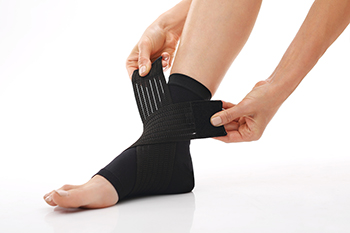
Ankle braces can help to support a weak ankle joint, as well as increase your mobility and protect the ankle from further injury. Anyone who has problems with plantar fasciitis, tendonitis, or previous ankle joint injuries may find it helpful to wear a brace. Experts believe it is best to wear an ankle brace after an injury, rather than beforehand, as a preventive measure. Constant use of an ankle brace can actually cause more harm than good, as it may prevent the surrounding muscles from gaining strength. Using a brace on occasion, say for a hike on uneven terrain or when playing a sport with a lot of lateral movement, is recommended. After an injury, a good ankle brace should provide support and stability during the healing process. In some cases, depending on the severity of the injury, a nylon boot may be recommended. As there are numerous types of ankle braces available, it’s a good idea to consult a podiatrist who can advise you on which one best suits your needs.
Ankle pain can be caused by a number of problems and may be potentially serious. If you have ankle pain, consult with one of our podiatrists from Active Foot and Ankle Care, LLC. Our doctors will assess your condition and provide you with quality foot and ankle treatment.
Ankle pain is any condition that causes pain in the ankle. Due to the fact that the ankle consists of tendons, muscles, bones, and ligaments, ankle pain can come from a number of different conditions.
Causes
The most common causes of ankle pain include:
Symptoms
Symptoms of ankle injury vary based upon the condition. Pain may include general pain and discomfort, swelling, aching, redness, bruising, burning or stabbing sensations, and/or loss of sensation.
Diagnosis
Due to the wide variety of potential causes of ankle pain, podiatrists will utilize a number of different methods to properly diagnose ankle pain. This can include asking for personal and family medical histories and of any recent injuries. Further diagnosis may include sensation tests, a physical examination, and potentially x-rays or other imaging tests.
Treatment
Just as the range of causes varies widely, so do treatments. Some more common treatments are rest, ice packs, keeping pressure off the foot, orthotics and braces, medication for inflammation and pain, and surgery.
If you have any questions, please feel free to contact our offices located in Fair Lawn, Riverdale, and Englewood, NJ . We offer the newest diagnostic and treatment technologies for all your foot care needs.

Choosing shoes that are the correct size and fit can prevent unwanted foot injuries and discomfort. Key tips for finding perfect shoes are discussed here. Trace your foot and put the shoe you might buy on top of that tracing to see if it is the right size and shape. Shop for shoes in the afternoon as the foot naturally expands during the day. Wear the same foot coverings to the store that you might wear with the shoes being bought. Have a salesperson measure both feet and go with the size of your larger foot (if one of your feet is larger than the other). While standing, make sure the shoes have enough room in the toe box for the toes to move freely. Walk around in the shoes to make sure they fit properly. Are they wide enough, and not too snug or loose? Choose comfortable shoes by making sure the shoe does not have tags or seams that might irritate the foot or cause friction. Finally, examine the soles of the shoes to make sure they are sturdy and provide enough cushioning. If you are having trouble finding shoes that work well for your feet or are experiencing any kind of foot pain, consult with a podiatrist who can provide insight on shoes to purchase for your feet, as well as treat any foot problems you might have.
It is important to find shoes that fit you properly in order to avoid a variety of different foot problems. For more information about treatment, contact one of our podiatrists from Active Foot and Ankle Care, LLC. Our doctors will treat your foot and ankle needs.
Proper Shoe Fitting
Shoes have many different functions. They cushion our body weight, protect our feet, and allow us to safely play sports. You should always make sure that the shoes you wear fit you properly in order to avoid injuries and deformities such as: bunions, corns, calluses, hammertoes, plantar fasciitis, stress fractures, and more. It is important to note that although a certain pair of shoes might be a great fit for someone else, that doesn’t mean they will be a great fit for you. This is why you should always try on shoes before buying them to make sure they are worth the investment. Typically, shoes need to be replaced ever six months to one year of regular use.
Tips for Proper Shoe Fitting
The shoes you buy should always feel as good as they look. Shoes that fit properly will last longer, feel better, and improve your way of life each day.
If you have any questions, please feel free to contact our offices located in Fair Lawn, Riverdale, and Englewood, NJ . We offer the newest diagnostic and treatment technologies for all your foot care needs.
I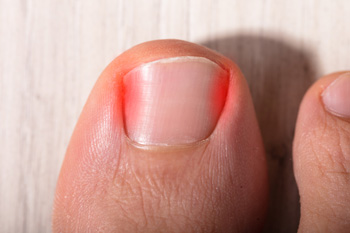 ngrown toenails can occur in individuals of all ages when the side of the nail digs into the skin. This condition is most prevalent in one’s big toe and will cause pain, discomfort, and redness where the ingrown nail meets the skin. Although the causes of ingrown toenails are varied, this condition frequently occurs due to improper nail care. If a toenail is cut too short, for example, the skin on the side of the nail can grow over top of the nail, eventually making it ingrown. Ingrown toenails can also develop when a toenail completely falls off following a serious foot injury or when the nail is severely ripped or misshapen. Some ingrown toenails—notably, milder ones—do not require immediate medical attention. However, making yourself aware of ingrown toenails is important to maintaining healthy feet because this condition can quickly become dangerous. Ingrown toenails may sometimes become infected, producing pus, swelling, warmness, and even unpleasant odors where the ingrown nail meets the skin. Letting such an infection go untreated may exacerbate the condition and the pain felt in the toenail. Upon receiving proper medical attention, your ingrown nail may be cared for by draining pus or removing sections of the ingrown nail. It is suggested you consult with your podiatrist if you feel an ingrown toenail is getting serious.
ngrown toenails can occur in individuals of all ages when the side of the nail digs into the skin. This condition is most prevalent in one’s big toe and will cause pain, discomfort, and redness where the ingrown nail meets the skin. Although the causes of ingrown toenails are varied, this condition frequently occurs due to improper nail care. If a toenail is cut too short, for example, the skin on the side of the nail can grow over top of the nail, eventually making it ingrown. Ingrown toenails can also develop when a toenail completely falls off following a serious foot injury or when the nail is severely ripped or misshapen. Some ingrown toenails—notably, milder ones—do not require immediate medical attention. However, making yourself aware of ingrown toenails is important to maintaining healthy feet because this condition can quickly become dangerous. Ingrown toenails may sometimes become infected, producing pus, swelling, warmness, and even unpleasant odors where the ingrown nail meets the skin. Letting such an infection go untreated may exacerbate the condition and the pain felt in the toenail. Upon receiving proper medical attention, your ingrown nail may be cared for by draining pus or removing sections of the ingrown nail. It is suggested you consult with your podiatrist if you feel an ingrown toenail is getting serious.
Ingrown toenails can become painful if they are not treated properly. For more information about ingrown toenails, contact one of our podiatrists of Active Foot and Ankle Care, LLC. Our doctors can provide the care you need to keep you pain-free and on your feet.
Ingrown Toenails
Ingrown toenails occur when a toenail grows sideways into the bed of the nail, causing pain, swelling, and possibly infection.
Causes
Prevention
Because ingrown toenails are not something found outside of shoe-wearing cultures, going barefoot as often as possible will decrease the likeliness of developing ingrown toenails. Wearing proper fitting shoes and using proper cutting techniques will also help decrease your risk of developing ingrown toenails.
Treatment
Ingrown toenails are a very treatable foot condition. In minor cases, soaking the affected area in salt or antibacterial soaps will not only help with the ingrown nail itself, but also help prevent any infections from occurring. In more severe cases, surgery is an option. In either case, speaking to your podiatrist about this condition will help you get a better understanding of specific treatment options that are right for you.
If you have any questions please feel free to contact our offices located in Fair Lawn, Riverdale, and Englewood, NJ . We offer the newest diagnostic and treatment technologies for all your foot and ankle needs.
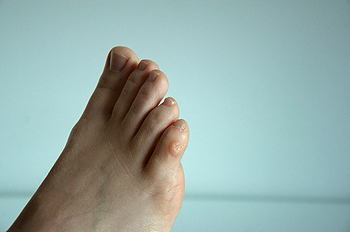
When a small area of thickened skin appears on the toes it can be indicative of a corn. Corns typically result from excessive friction which can happen from wearing socks or shoes that are too tight. Soft corns form in between the toes and are generally moist because of the area they are located. Hard corns can form on the outside of the pinky toe or on top of the toes. The core is located in the middle of the corn and is the part of the foot that endures the most amount of friction. Corns can cause extreme pain and discomfort, but relief may be found when the offending shoe is removed. The gait or walking style may be affected when a corn is present. This is the body’s natural defense in realigning the body to minimize existing corn pain. Many patients find the best shoes to wear have low heels and are comfortable with adequate room for the toes to move freely in. A pumice stone can be used on mild corns and this may help to reduce its size. If you have a large or stubborn corn that is prolonged after new shoes are worn, please confer with a podiatrist who can prescribe medicine to remove the corn.
Corns can make walking very painful and should be treated immediately. If you have questions regarding your feet and ankles, contact one of our podiatrists of Active Foot and Ankle Care, LLC. Our doctors will treat your foot and ankle needs.
Corns: What Are They? And How Do You Get Rid of Them?
Corns are thickened areas on the skin that can become painful. They are caused by excessive pressure and friction on the skin. Corns press into the deeper layers of the skin and are usually round in shape.
Ways to Prevent Corns
There are many ways to get rid of painful corns such as:
Treating Corns
Although most corns slowly disappear when the friction or pressure stops, this isn’t always the case. Consult with your podiatrist to determine the best treatment option for your case of corns.
If you have any questions please feel free to contact our offices located in Fair Lawn, Riverdale, and Englewood, NJ . We offer the newest diagnostic and treatment technologies for all your foot and ankle needs.
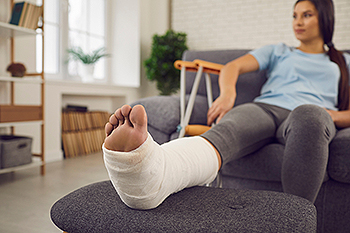
A broken ankle can cause severe pain and discomfort. It generally occurs from a fall and can affect one or several bones in the ankle. Some patients can hear the bone break at the time of the injury and this may sound like a grinding or snapping noise. Common symptoms can include swelling or bruising, and it is often difficult to walk. In severe fractures, the bone may protrude from the skin and appear deformed. It is important to have an X-ray performed which can determine the severity of the fracture. Relief may be found when keeping weight off of the affected foot and frequently elevating the foot may also reduce existing swelling. Many broken ankles are treated by wearing a cast or a boot. This is effective in keeping the ankle stable as healing takes place. It may be easier to walk when crutches are used. If you have broken your ankle, please consult a podiatrist immediately who can properly diagnose your condition and offer treatment options which may include surgery for severe breaks.
Broken ankles need immediate treatment. If you are seeking treatment, contact one of our podiatrists from Active Foot and Ankle Care, LLC. Our doctors can provide the care you need to keep you pain-free and on your feet.
Broken Ankles
A broken ankle is experienced when a person fractures their tibia or fibula in the lower leg and ankle area. Both of these bones are attached at the bottom of the leg and combine to form what we know to be our ankle.
When a physician is referring to a break of the ankle, he or she is usually referring to a break in the area where the tibia and fibula are joined to create our ankle joint. Ankles are more prone to fractures because the ankle is an area that suffers a lot of pressure and stress. There are some obvious signs when a person experiences a fractured ankle, and the following symptoms may be present.
Symptoms of a Fractured Ankle
If you suspect an ankle fracture, it is recommended to seek treatment as soon as possible. The sooner you have your podiatrist diagnose the fracture, the quicker you’ll be on the way towards recovery.
If you have any questions, please feel free to contact our offices located in Fair Lawn, Riverdale, and Englewood, NJ . We offer the newest diagnostic and treatment technologies for all your foot care needs.
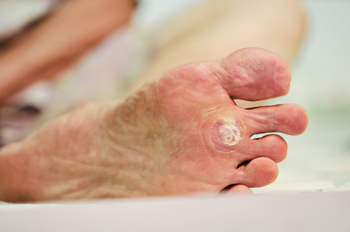
Research has shown that plantar warts affect approximately ten percent of the population. They are warts that develop on the sole of the foot, and grow inward as a result of the weight the feet endure on a daily basis. They are generally caused by the human papilloma virus (HPV), and can enter the body through small cuts in the skin on the feet. They are prone to developing on the ball and heel of the foot, and are considered to be hyperkeratotic eruptions. Plantar warts can cause severe pain and discomfort, and aggressive treatment may be necessary to relieve the pain while walking. Some patients have to alter their style of walking if they have a plantar wart, and their posture may be affected. If you have a wart on the bottom of your foot, please seek the counsel of a podiatrist who can effectively treat this condition.
Plantar warts can be very uncomfortable. If you need your feet checked, contact one of our podiatrists from Active Foot and Ankle Care, LLC. Our doctors will assist you with all of your foot and ankle needs.
About Plantar Warts
Plantar warts are the result of HPV, or human papillomavirus, getting into open wounds on the feet. They are mostly found on the heels or balls of the feet.
While plantar warts are generally harmless, those experiencing excessive pain or those suffering from diabetes or a compromised immune system require immediate medical care. Plantar warts are easily diagnosed, usually through scraping off a bit of rough skin or by getting a biopsy.
Symptoms
Treatment
To help prevent developing plantar warts, avoid walking barefoot over abrasive surfaces that can cause cuts or wounds for HPV to get into. Avoiding direct contact with other warts, as well as not picking or rubbing existing warts, can help prevent the further spread of plantar warts. However, if you think you have developed plantar warts, speak to your podiatrist. He or she can diagnose the warts on your feet and recommend the appropriate treatment options.
If you have any questions please feel free to contact our offices located in Fair Lawn, Riverdale, and Englewood, NJ . We offer the newest diagnostic and treatment technologies for all your foot and ankle needs.
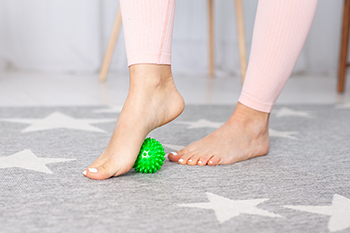
Many forms of exercise target the larger muscle groups, and the small muscles in the feet may be overlooked. Research has shown that when the ball of the foot is properly stretched, the overall foot may become stronger by improving arch and surrounding ligaments. An effective stretch is referred to as the golf ball stretch. This is done by rolling the sole of the foot over a golf ball for several minutes, then switching feet. Many people find it beneficial to walk on their tip toes, and this can help to build up the balls of the feet. Additionally, calf raises can be done with resistance as the strength in the feet increases. Having a full range of motion in your feet is essential in keeping the feet strong. This can be practiced by standing on a stool while dangling the legs. The big toe can be used as an imaginary pencil, and letters of the alphabet can be drawn with the toes. If you would like additional information about how exercise can benefit the feet, please contact a podiatrist who can provide useful information.
Exercising your feet regularly with the proper foot wear is a great way to prevent injuries and build strength. If you have any concerns about your feet, contact one of our podiatrists from Active Foot and Ankle Care, LLC. Our doctors can provide the care you need to keep you pain-free and on your feet.
Exercise for Your Feet
Exercise for your feet can help you gain strength, mobility and flexibility in your feet. They say that strengthening your feet can be just as rewarding as strengthening another part of the body. Your feet are very important, and we often forget about them in our daily tasks. But it is because of our feet that are we able to get going and do what we need to. For those of us fortunate enough to not have any foot problems, it is an important gesture to take care of them to ensure good health in the long run.
Some foot health exercises can include ankle pumps, tip-toeing, toe rises, lifting off the floor doing reps and sets, and flexing the toes. It is best to speak with Our doctors to determine an appropriate regimen for your needs. Everyone’s needs and bodies are different, and the activities required to maintain strength in the feet vary from individual to individual.
Once you get into a routine of doing regular exercise, you may notice a difference in your feet and how strong they may become.
If you have any questions please feel free to contact our offices located in Fair Lawn, Riverdale, and Englewood, NJ . We offer the newest diagnostic and treatment technologies for all your foot and ankle needs.
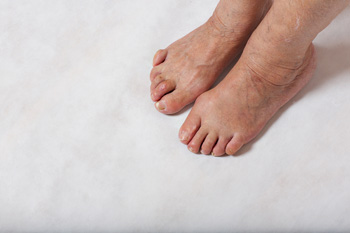
The foot condition that is known as hammertoe is considered to be a deformity. It is a noticeable ailment that affects the toes, and can resemble a hammer. The middle joint of the second toe bends downward, and corns may form on top of the affected joint. The toes are made of muscles, bones, joints, tendons, and ligaments. These vital parts of the toe work together to bend and straighten the toes, and hammertoe can develop if there is an imbalance in the toe structure. It can come from wearing shoes that do not have adequate room for the toes to move freely in, or from shoes that are too tight. Wearing the wrong footwear can squeeze the toes into a bent position. There are some patients who may be prone to developing this deformity that have existing medical conditions including flat feet, or longer toe bones. Relief may be found when specific stretches are practiced, including toe flexion and extension, and performing a foam roll massage. If you have been afflicted with hammertoe, please confer with a podiatrist who can determine the severity of this condition, and recommend correct treatment options.
Hammertoe
Hammertoes can be a painful condition to live with. For more information, contact one of our podiatrists from Active Foot and Ankle Care, LLC. Our doctors will answer any of your foot- and ankle-related questions.
Hammertoe is a foot deformity that affects the joints of the second, third, fourth, or fifth toes of your feet. It is a painful foot condition in which these toes curl and arch up, which can often lead to pain when wearing footwear.
Symptoms
Causes
Genetics – People who are genetically predisposed to hammertoe are often more susceptible
Arthritis – Because arthritis affects the joints in your toes, further deformities stemming from arthritis can occur
Trauma – Direct trauma to the toes could potentially lead to hammertoe
Ill-fitting shoes – Undue pressure on the front of the toes from ill-fitting shoes can potentially lead to the development of hammertoe
Treatment
Orthotics – Custom made inserts can be used to help relieve pressure placed on the toes and therefore relieve some of the pain associated with it
Medications – Oral medications such as anti-inflammatories or NSAIDs could be used to treat the pain and inflammation hammertoes causes. Injections of corticosteroids are also sometimes used
Surgery – In more severe cases where the hammertoes have become more rigid, foot surgery is a potential option
If you have any questions please contact our offices located in Fair Lawn, Riverdale, and Englewood, NJ . We offer the newest diagnostic and treatment technologies for all your foot and ankle needs.
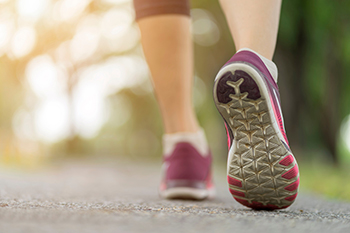
Walking is an activity that as soon as we learn how to do it, we take it for granted. However, sometimes walking can become difficult because of age, illness, injury, or other factors. Symptoms that may develop are shooting pain, numbness and tingling, stiffness, imbalance, weakness, and limping. Types of gait abnormalities include walking with your head and neck pushed forward, walking with legs bent inward, dragging the feet while walking, waddling from side to side, and toes scraping the ground with each step. Among the many causes that can affect your gait are nerve damage, improper alignment of the body, lack of muscle strength and flexibility, inflammatory diseases and conditions, autoimmune deficiencies, injury, and stroke. If you notice an increased difficulty walking and are experiencing any of the symptoms listed above, please consult a podiatrist who can conduct a complete examination and offer an appropriate treatment plan.
If you have any concerns about your feet, contact one of our podiatrists from Active Foot and Ankle Care, LLC. Our doctors can provide the care you need to keep you pain-free and on your feet.
Biomechanics in Podiatry
Podiatric biomechanics is a particular sector of specialty podiatry with licensed practitioners who are trained to diagnose and treat conditions affecting the foot, ankle and lower leg. Biomechanics deals with the forces that act against the body, causing an interference with the biological structures. It focuses on the movement of the ankle, the foot and the forces that interact with them.
A History of Biomechanics
Modern technological improvements are based on past theories and therapeutic processes that provide a better understanding of podiatric concepts for biomechanics. Computers can provide accurate information about the forces and patterns of the feet and lower legs.
Understanding biomechanics of the feet can help improve and eliminate pain, stopping further stress to the foot.
If you have any questions please feel free to contact our offices located in Fair Lawn, Riverdale, and Englewood, NJ . We offer the newest diagnostic and treatment technologies for all your foot and ankle needs.
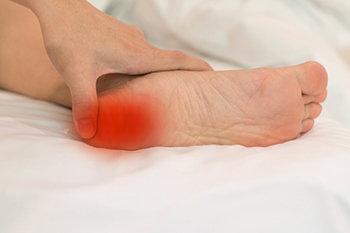
The heel condition that is referred to as Sever’s disease generally affects children and young teenagers who are involved in sporting activities. The heel can often feel sore when Sever’s disease is present, and it may be difficult to walk. It is defined as a condition that affects the growth plate in the heel, and can be confirmed by having a physical examination performed. Relief is often found when the activity that caused the condition is stopped, and the heel is frequently rested. It is important to practice specific stretches once the heel feels better, and this may help to accelerate the recovery process. Many patients choose to wear a heel cushion in their shoe which may be able to provide additional padding. If your child is affected by Sever’s disease, it is advised that a podiatrist be consulted for proper prevention and healing tips.
Sever's disease often occurs in children and teens. If your child is experiencing foot or ankle pain, see one of our podiatrists from Active Foot and Ankle Care, LLC. Our doctors can treat your child’s foot and ankle needs.
Sever’s Disease
Sever’s disease is also known as calcaneal apophysitis, which is a medical condition that causes heel pain I none or both feet. The disease is known to affect children between the ages of 8 and 14.
Sever’s disease occurs when part of the child’s heel known as the growth plate (calcaneal epiphysis) is attached to the Achilles tendon. This area can suffer injury when the muscles and tendons of the growing foot do not keep pace with bone growth. Therefore, the constant pain which one experiences at the back of the heel will make the child unable to put any weight on the heel. The child is then forced to walk on their toes.
Symptoms
Acute pain – Pain associated with Sever’s disease is usually felt in the heel when the child engages in physical activity such as walking, jumping and or running.
Highly active – Children who are very active are among the most susceptible in experiencing Sever’s disease, because of the stress and tension placed on their feet.
If you have any questions, please feel free to contact our offices located in Fair Lawn, Riverdale, and Englewood, NJ . We offer the newest diagnostic and treatment technologies for all your foot and ankle injuries.
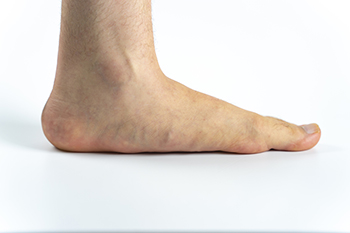
Flat feet is generally easy to notice when one is barefoot. While standing flat on the floor, a person that has flat feet will have a small or absent arch, which causes the foot to lie completely flat on the floor. There are some patients who are pregnant or overweight and will develop flat feet temporarily. When their condition changes, the feet will resume their arch. People who enjoy running may experience conditions throughout their bodies that may be related to having flat feet. Flat feet can cause over-pronation, which is when the feet roll inward. It can be a common condition among runners, and it is beneficial to maintain a healthy weight which can lessen the pressure on the feet. Additionally, it is important to follow a good training practice, which may prevent overuse injuries. If you have flat feet, it is suggested that you are under the care of a podiatrist who can prescribe custom made orthotics or shoe inserts specifically designed to your feet.
Flatfoot is a condition many people suffer from. If you have flat feet, contact one of our podiatrists from Active Foot and Ankle Care, LLC. Our doctors will treat your foot and ankle needs.
What Are Flat Feet?
Flatfoot is a condition in which the arch of the foot is depressed and the sole of the foot is almost completely in contact with the ground. About 20-30% of the population generally has flat feet because their arches never formed during growth.
Conditions & Problems:
Having flat feet makes it difficult to run or walk because of the stress placed on the ankles.
Alignment – The general alignment of your legs can be disrupted, because the ankles move inward which can cause major discomfort.
Knees – If you have complications with your knees, flat feet can be a contributor to arthritis in that area.
Symptoms
Treatment
If you are experiencing pain and stress on the foot you may weaken the posterior tibial tendon, which runs around the inside of the ankle.
If you have any questions please feel free to contact our offices located in Fair Lawn, Riverdale, and Englewood, NJ . We offer the newest diagnostic and treatment technologies for all your foot and ankle needs.






